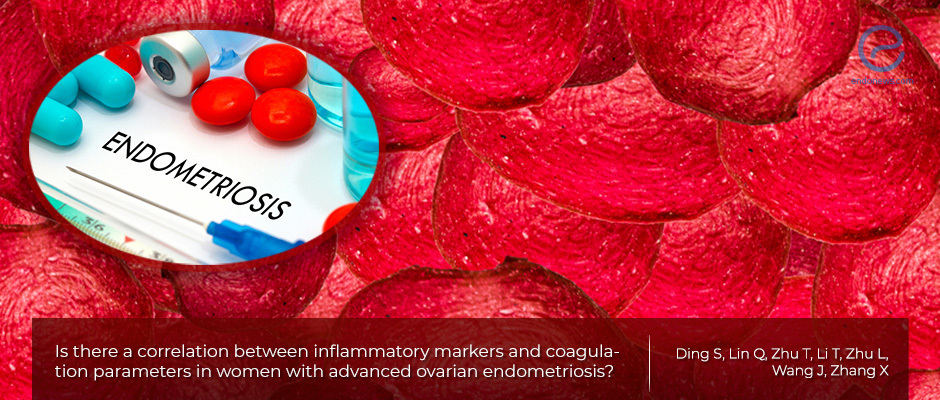Endometriosis and Women’s Tendency Towards Blood Clotting
Feb 21, 2020
An increased tendency towards blood clotting could be associated with endometriosis and may be used as a diagnostic tool.
Key Points
Highlights:
- Women with endometrioma have an increased tendency towards blood clotting likely due to the inflammatory nature of endometriosis.
Importance:
- Women’s blood clotting parameters could be used to diagnose endometriosis, but more research is needed.
What's done here:
- A total of 548 women who had undergone surgery either to treat ovarian endometrioma, remove benign ovarian cysts, or for tubal re-anastomosis were analyzed.
- Inflammatory markers and coagulation parameters in the blood of all women were examined.
Key results:
- The thrombin time and prothrombin time were significantly shorter in women with ovarian endometriomas compared to healthy women and those with benign ovarian cysts.
- The levels of fibrinogen were significantly higher in the blood of women with ovarian endometriomas compared to healthy women and those with benign ovarian cysts.
- The levels of fibrinogen were positively correlated with inflammatory markers such as C-reactive protein, neutrophil-to-lymphocyte ratio, and platelet-to-lymphocyte ratio.
- Levels of CA-125 were significantly higher in women with ovarian endometriomas compared to those with benign ovarian cysts.
Limitations:
- This is a retrospective study and therefore has many disadvantages.
- All the recruited women were in the proliferative or second phase of the menstrual cycle when the lining of the uterus grows and proliferates. Although coagulation status usually remains unchanged during the different phases of the menstrual cycle in healthy women, it is not known whether this is the case in women with endometriosis.
- Only women with advanced endometriosis were included in the study and the coagulation status and its influence on inflammation in other diseases are not known.
Lay Summary
Women with ovarian endometriomas have an abnormally increased tendency toward blood clotting, study shows. Researchers think that this is due to the inflammatory nature of endometriosis. So abnormal coagulation parameters could be used to diagnose endometriosis, however, more detailed studies in a larger group of patients are needed in order to confirm the potential diagnostic power of the blood clotting parameter.
It was already known that increased coagulation parameters including fibrinogen (a glycoprotein that circulates in the blood and that is turned into fibrin and a blood clot in case of injury) and platelets (cell fragments also involved in blood clotting) are associated with endometriosis.
In the present study, which was published in BMC Women’s Health, researchers aimed to determine the levels of inflammatory markers and coagulation parameters and how they are correlated in women with endometriomas and healthy women or those with benign ovarian cysts.
In order to do so, they recruited 226 women who underwent laparoscopic or laparotomic surgery for ovarian endometriomas, 210 women for benign ovarian cysts, and 112 women for tubal re-anastomosis, a surgical method used to reverse tubal ligation where the fallopian tubes are tied to prevent pregnancy. They determined inflammatory markers and coagulation parameters in all women.
The inflammatory markers they used were:
- C-reactive protein, a substance produced by the liver in response to inflammation
- Neutrophil-to-lymphocyte ratio, which is used as a marker of subclinical inflammation
- Platelet-to-lymphocyte ratio
The coagulation parameters used were:
- Platelet count
- Thrombin time, the time it takes for a clot to form
- Prothrombin time another measure of blood clotting time
- Activated partial thromboplastin time, a person's ability to appropriately form blood clots
- Fibrinogen
- CA-125 or cancer antigen 125, which is generally elevated in ovarian cancer.
The researchers found that the thrombin and prothrombin times were significantly shorter in women with ovarian endometriomas compared to healthy women and those with benign ovarian cysts. Moreover, the levels of fibrinogen were significantly higher in the blood of women with ovarian endometriomas compared to the other two groups. These findings suggest that women with endometriomas have an increased tendency towards blood clotting compared to healthy women or those with benign ovarian cysts.
The researchers also found that the levels of fibrinogen were positively correlated with inflammatory markers such as C-reactive protein, and neutrophil-to-lymphocyte and platelet-to-lymphocyte ratios.
Finally, the levels of CA-125 were significantly higher in women with ovarian endometriomas compared to women with benign ovarian cysts.
The researchers calculated that the combination of CA-125 and fibrinogen had the highest sensitivity and specificity for the diagnosis of endometriosis. However, they added that to determine whether abnormal coagulation parameters can contribute to the diagnosis and treatment of endometriosis, a more detailed study of large samples is needed.
Research Source: https://www.ncbi.nlm.nih.gov/pubmed/31888633
endometrioma benign ovarian cyst coagulation parameters markers of inflammation diagnosis

